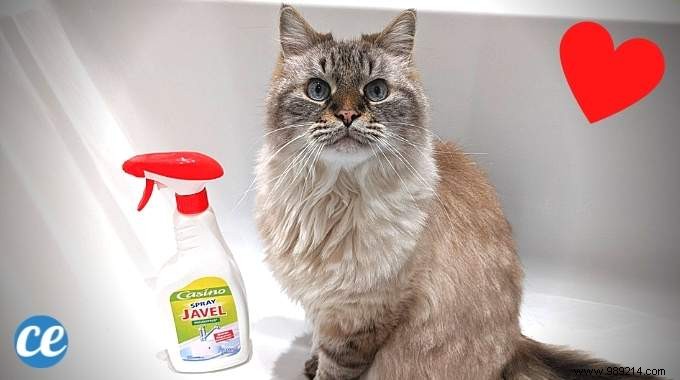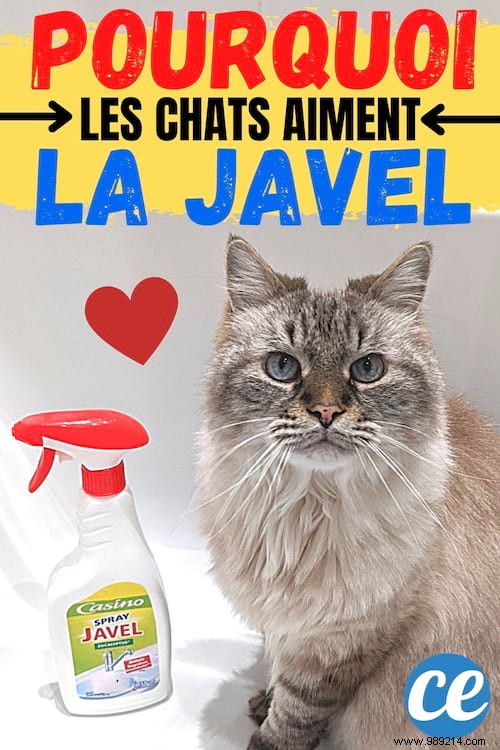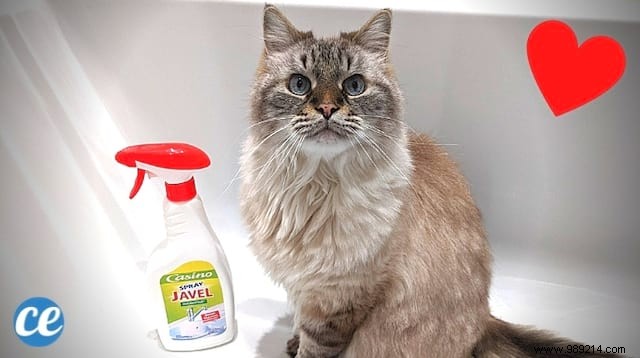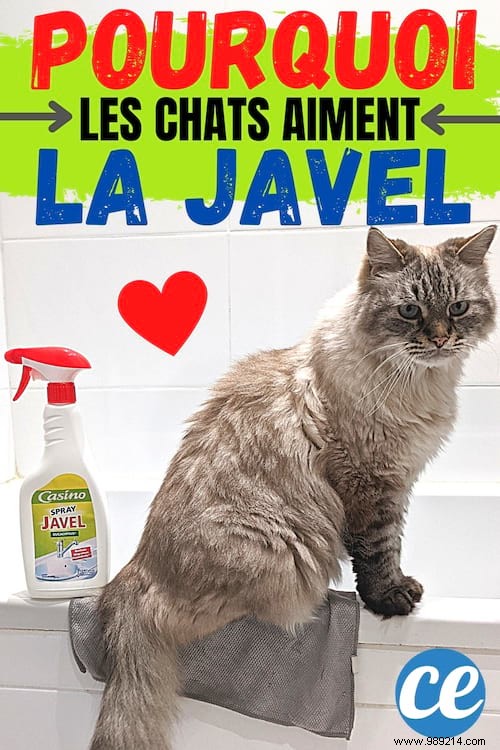
Have you ever seen your cat frantically rolling around on the floor as you just washed with bleach?
Mine drives him crazy!
Because all cats love the smell of bleach. But why?
Because the smell of bleach resembles that of the pheromones of their congeners, or even their urine.
I explain here how and why bleach attracts cats. But above all how to avoid poisoning your cat.
Here are 7 tips for bleach and your cat to get along . Watch:

Pheromones are substances, a bit like hormones, secreted or excreted by animals.
This allows them to recognize each other or send a message to their fellow creatures.
It's a kind of business card, especially to let others know that it's time to mate.
In humans, the process is the same, but it is often hidden by the perfumes and deodorants we put on.
I can't see us sniffing our asses every time we meet.
It is the chlorine contained in the bleach that is responsible for this behavior.
Products containing it cause this reaction in cats, while other products scare them away.
The cat's developed sense of smell detects elements in the bleach that resemble the smell, or even the urine of other cats.
And that's what excites them.
We are sometimes embarrassed by the smell of bleach while our cat goes crazy.
On the contrary, cleaning products with very chemical flowery smells please us, while they leave our felines unmoved.
The pheromonal elements that the cat will pick up are likely to disturb or interest it.
His reaction is to rub like crazy, drool and sometimes even bite or pee there.
Catnip, like bleach, causes this reaction.
It smells like pheromones because of an oil called nepetalactone.
Fortunately, unlike bleach, catnip is not toxic or dangerous to the cat.
Be careful though, once the cat is under the influence of catnip, it borders on hysteria!
Some become borderline aggressive, others crazy to the point of being able to leave a small scratch on your curtains, your furniture or your arm.
But not on purpose, of course!

Surely you already know this, but bleach water is a dangerous product in the home.
Fortunately, it can be replaced by equally effective natural products.
But if you have some at home, you should always be careful with bleach.
It can cause deep and painful burns on the skin.
And if you have a cat, you have to be extra vigilant. Why?
Because it is extremely dangerous for cats.
Not only because they are attracted to bleach.
But also because they can walk on the floor that has just been bleached...
The product then settles on their paws and can injure them.
Additionally, they may lick their paws and ingest the bleach.
Worse, some actually lick the bleached floor!
It's that easy to poison your little four-legged friend.
The other cause of potential poisoning is chlorine fumes.
When you mix bleach with ammonia, you create chlorine gas which is toxic.
However, it is clearly indicated on the label not to mix them.
Cat urine is nothing but ammonia.
The biggest mistake a cat owner can make is cleaning up cat pee with bleach.
In addition, cat urine contains much more urea than dog urine, a major ingredient in ammonia.
And this is enough to create toxic chlorine once in contact with the bleach.
Now you know why you should never wash a "cat pee" area with bleach.
Another mistake not to make:apply bleach as a repellent to ward off feral cats that mark their territory.
You will cause the opposite effect:they will all come to urinate in this place precisely to try to cover this smell.
Instead, use white vinegar to repel cats.
To discover: 9 Tricks To Get CATS AWAY FROM Your Garden PERMANENTLY.
If you use bleach, wash your hands afterwards to make sure you have removed it from your skin.
Better:put on gloves to handle it!
By taking simple, common-sense precautions, you can save yourself a lot of headaches.
No matter what, your cats will always smell the scent on your hands.
It doesn't matter.
They can smell it even just by touching clothes that have been bleached.
So it's really the smell that attracts them and not the product itself.
If your cat touches bleach or swallows it, the symptoms are quickly visible:
- irritated skin
- mouth ulceration
- red and watery eyes
- drooling or vomiting
- difficulty swallowing
If you think your cat has come into contact with bleach, but isn't showing symptoms, check the skin under their fur.
Smell if the smell of bleach is deposited on his paws.
If so, immediately wash the pads with a mild soap (such as Marseille soap).
And make an appointment quickly with the veterinarian.
If the cat has ingested bleach and is showing the above symptoms, offer water or a little mash mixed with water to dilute the product.
Don't make him vomit, it will damage the esophagus even more. Make an emergency appointment with the veterinarian.

Watching a cat go crazy while sniffing bleach is quite funny.
They get really crazy and rub all over the place.
Even the oldest cats regain their youth.
All this remains good child provided that the cat does not intoxicate itself with the product.
Of course, never deliberately offer bleach to your cat to get it excited.
If you want to see that, give her this toy with catnip in it.
At least it's not toxic.